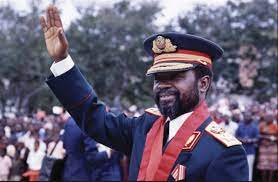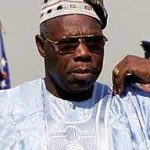Four weeks ago, I wrote a piece on this page in remembrance of Thomas Sankara. I had argued that given the situation on the African continent today, with a rampaging neo-liberal agenda and the battle for Africa’s historical memory, it has become imperative to intensify the contestation of the terrain of memory, especially because of the younger generation of Africans growing up in these very disturbed times.
I was determined to look at the OTHER side of African history, told through the actions and speeches of individuals who impacted upon our history and our continent from the standpoint and perspective of the masses of the African people. I feel that heroic individuals and their actions can inspire newer generations of people to become actively engaged in the process of building new blocks of history. This is very important now, more than ever before. That explains the piece that I wrote about Thomas Sankara. It is equally significant that October 19th, 2006, marked the twentieth anniversary of the tragic death of Samora Machel, the founding President of an independent Mozambique.
Machel had attended a meeting of the Frontline States of Southern Africa at the height of the struggle against apartheid. Shortly after 2100HRS on that Sunday night, the Tupolev 134A jet plane crashed into a hillside in the Mbuzini area o f the eastern Transvaal, South Africa.
I have visited the site o f the South African Truth and Reconciliation Commission where the records have been kept as ‘THE, CASE ‘SAMORA MACHEL’”, to get a detailed summary of the facts of that crash, which killed President Samora Machel and thirty-three others, while ten people survived. The plane had made a fatal turn towards the South African border because it was following signals of a very high frequency omni-directional radio (VOR) which was not that of Maputo, the capital of Mozambique. An international Commission of Inquiry, comprising representatives of Mozambique, South Africa and the Soviet Union concluded on the basis of the ‘black box’ cockpit voice recorder that the crew of the plane made a fatal turn to the right, away from its correct flight path because they were following a radio beacon (VOR) that was not that of Maputo. They believed that this was the Maputo airport; the report further added that the instrument panel of the plane showed that at least one of the navigational dials was set for the correct Maputo frequency.
Given the atmosphere of suspicion existing between apartheid South Africa and the African countries, especially the frontline states such as Mozambique, which were the bases of the armed liberation struggle against apartheid, there has lingered a suspicion, not conclusively proved to this day, that President Samora Machel’s death was not an accident. Many people believe that Samora Machel’s plane was diverted from its correct flight path by outside electronic interference with its navigational instruments. This action could have been carried out by a false emitter of beacon which is pre-positioned. It was also said that Israel had built up a considerable experience in electronic deception techniques and given the close military relations existing between the apartheid regime and the Zionist state of Israel, there would be no problem in South Africa being provided with the know-how. But as I said earlier, nothing conclusive in this respect has ever been proved.
There was however a number of strange happenings that lent credence to the suspicion that people felt twenty years ago about Samora Machel’s death, which the passing of two decades has not dispelled. In the first place, Machel had been a marked man by the apartheid regime despite the signing of the Nkomati Accord between Mozambique and South Africa. The apartheid regime did not cease its support for the REN AMO bandits that were causing a major disruption of economic, political and social life in Mozambique. This led in turn to a renewed support for the activities of the ANC by the FRELIMO government of Mozambique. In retaliation, the South African regime banned new migrations of workers into South African mines, thus affecting a major source of revenue for Mozambique’s economy. A few days before ‘ the crash that claimed his life, the South African Defence Minister, General Magnus Malan had threatened President Samora Machel personally.
In the same period, the RENAMO group launched an offensive which aimed to cut Mozambique into two parts; and while the frontline states had put pressure on President Banda of Malawi to expel RENAMO forces, he allowed the group to cross into the provinces of Tete and Zambesia, where FRELIMO had few troops and the RENAMO offensive approached the city of Quilimane, which would have achieved the aim of cutting Mozambique into two. Another proposition which people had taken on board was that the South Africans felt that the combination of circumstances had led to a major weakening of the Mozambican leadership and was therefore on the verge of collapse. They had become tired of Samora Machel and if he was taken out, a power struggle was likely to ensue within the FRELIMO leadership which might precipitate the complete collapse of Mozambique.
Before setting out on that fateful trip to Lusaka, Zambia, Machel organised a meeting with journalists, the military and the party leadership, during which he revealed that he had received information that the South African regime wanted to kill him. He then gave clear instructions on what to do if he would not come back. The South African strategy failed, because no power struggle ensued as Joachim Chissano was immediately elected to replace Machel, while military forces were sent to Zambesia province to counter the RENAMO offensive on the exact day that had been fixed by Samora Machel.
President Machel’s bodyguard, Fernando Manuel Joao survived the crash with the least injuries, and by midnight, managed to contact the South African police from a mission post telephone, requesting them to contact Mozambique about the crash. The South African police appeared on the scene by 2 a.m. (four hours after the crash), refused to go to the aid of survivors who were crying for assistance and as another survivor, Almeida Pedro later reported “all of them (were) collecting papers, diplomatic bags, dollars. They took a lot of things”
The South Africans refused to take the wounded to the hospital until about 8 a.m., almost eleven hours after the crash. It was also noted by the Mozambican Medical Commission that unknown persons interfered with bodies of six of the thirty-five who died in the crash. These bodies were found to have incisions already stitched up, on the sides of the neck. “The incisions, about seven centimeters long, were made with a sharp instrument on one or other side of the neck along the line of the cleido mastoideo muscle. It was not possible to establish the precise time at which the incisions had been made. The South African Prof. Nel advanced the theory that the cuts had been made to collect blood samples, but declared that it was not normal procedure”.
The inquiry was unable to establish a conclusive cause for the deviation of the plane from its track, but as the report from the Truth and Reconciliation Commission stated “All evidence in fact points … towards the only other hypothesis -that the plane was lured from its route by a powerful decoy VOR, transmitting on the same frequency as the Maputo VOR”. It was also observed that the South Africans had tracked the plane for hundreds of miles, even while it was over Zimbabwe and they did not warn the pilot that it was off course and was in danger of entering South African airspace until it finally crashed leading to the tragic death of Samora Machel, one of the most outstanding figures of the African struggle for independence.
Twenty years after his death, and at a time of a huge leadership deficit in Africa; in an era when commitment and passionate fervour of participation and selflessness as the hallmarks of leadership have been replaced by an unconscionable greed, surrender to the diktats of foreign institutions and governments; in an African continent which suffers from a poverty of leadership, despotism and megalomania, it is important for the younger patriots of Nigeria and of Africa to learn the lessons of sincere commitment to the welfare of the people, exemplified by Samora Machel.
It will be normal for the young African, the young Nigerian, who probably has not read a good book on African liberation to ask who on earth is Samora Machel? Machel was an outstanding leader of the Mozambique liberation movement, FRELIMO; he had trained as a nurse, which was one of the few professional opportunities open to African s under Portuguese colonialism. He experienced the humiliation of racism and oppression and therefore joined other patriots to form FRELIMO which became the vehicle of liberation of his country.
Samora Machel was the commander of the guerrilla forces of FRELIMO which fought brilliantly to decisively defeat the armies of fascist Portugal. A remarkable aspect of the anti-colonial struggles in the Portuguese African colonies of Angola, Guinea Bissau and Mozambique, was that they were turned into revolutionary processes for both national and social liberation. And in fighting for African liberation, these movements helped to trigger the conditions which led to the overthrow of fascism in Portugal. It was therefore not an accident that these liberation struggles produced some of the most far-sighted heroes of the African peoples: Eduardo Mondlane and Samora Machel in Mozambique, Dr Augustinho Neto in Angola and Amilcar Cabral in Guinea Bissau/Cape Verde.
Recently, to commemorate the twentieth anniversary of his death, a monument was dedicated at the site of the crash which claimed Samora Machel’s life. The South African President, Thabo Mbeki wrote a tribute to Machel, which was published in the weekly bulletin of the ANC, from which I have quoted herein. “Today”, said Mbeki, “it seems a long time ago that we had the privilege to sit with Samora Machel, to hear him speak, to draw inspiration from his seemingly in exhaustible energy, his effervescence and optimism, his confidence that Mozambique, South Africa and Africa would overcome their problems, in the same way that the great FRELIMO liberation movement he led had, through struggle, ended 500 years of Portuguese colonization of Mozambique”
“And yet as we recall the memory of Samora Machel two decades after he died, the images of the living Samora flash in the mind, occasionally evoking an intense feeling that we can actually see this great hero of the people of Mozambique and Africa and that we are indeed about to hear his voice again”, Mbeki wrote. “It is during such moments that we come to understand the enormous and indelible impact that Samora Machel made on us as individuals, on our movement and struggle, and- on the future of our country”.
President Thabo Mbeki went further that “ It is such moments that we come to understand that Samora Machel became part of us, our own national hero that cannot be separated from all our other national heroes and heroines. The terrible news broke upon the world and us on October 20, 1986 that the plane carrying Samora Machel had crashed on South African territory the previous night, killing him and 34 other people, including the Soviet crew that flew the fated plane. And as we grieved, we ask the question that has still not been answered was the apartheid regime responsible for the tragic deaths at Mbuzini?” Such was the stature of Samora Machel, an outstanding fighter for African liberation.


